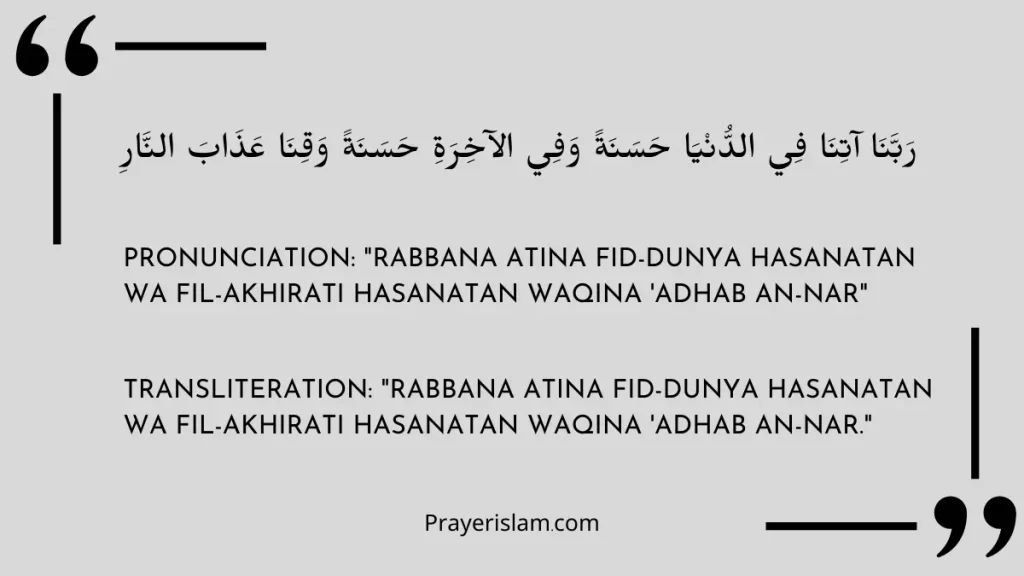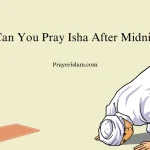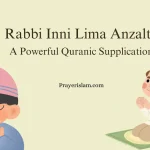In Islam, supplications (duas) hold immense significance as they connect believers with Allah, seeking His guidance and blessings. One such profound dua is “fid dunya wal akhirah,” which emphasizes the well-being of both worldly life and the hereafter. In this blog post, we’ll delve into the various aspects of this dua, including its meaning, significance, and the best times to recite it.
Fid-Dunya Wal Akhirah in Arabic: Full Dua
The dua “fid dunya wal akhirah” is a part of a longer supplication found in various Islamic texts. Here is the full dua in Arabic:
رَبَّنَا آتِنَا فِي الدُّنْيَا حَسَنَةً وَفِي الآخِرَةِ حَسَنَةً وَقِنَا عَذَابَ النَّارِ
Pronunciation: “Rabbana atina fid-dunya hasanatan wa fil-akhirati hasanatan waqina ‘adhab an-nar”
Transliteration: “Rabbana atina fid-dunya hasanatan wa fil-akhirati hasanatan waqina ‘adhab an-nar.”

Fid-Dunya Wal Akhirah Meaning
The meaning of this dua is: “Our Lord, give us in this world [that which is] good and in the Hereafter [that which is] good and protect us from the punishment of the Fire.”
This supplication encompasses the essence of seeking goodness and protection in both this life and the next, making it a comprehensive and holistic prayer.
Word Analysis and Interpretation
رَبَّنَا (Rabbana)
- Meaning: Our Lord
- Explanation: This word signifies a direct and personal appeal to Allah, highlighting the intimate relationship between the believer and their Creator. It expresses a deep sense of devotion and reliance on Allah for all needs.
آتِنَا (Atina)
- Meaning: Give us
- Explanation: This is a request, asking Allah to bestow His blessings and favors upon the supplicant. It reflects the believer’s trust in Allah’s generosity and mercy.
فِي الدُّنْيَا (Fid-dunya)
- Meaning: In this world
- Explanation: This phrase refers to the current, tangible life that we live. It encompasses all aspects of worldly existence, including health, wealth, happiness, and overall well-being.
حَسَنَةً (Hasanatan)
- Meaning: Goodness or blessings
- Explanation: This term is broad and includes all forms of positive outcomes. It refers to anything beneficial, whether material or spiritual, that can enhance a person’s life and bring them closer to contentment and peace.
وَفِي الآخِرَةِ (Wa fil-akhirati)
- Meaning: And in the Hereafter
- Explanation: This phrase shifts the focus from the worldly life to the eternal life after death. It signifies the importance of seeking Allah’s favor not just in this transient world but also in the everlasting life to come.
حَسَنَةً (Hasanatan)
- Meaning: Goodness or blessings
- Explanation: Similar to its use for the dunya, here it means blessings and positive outcomes in the Hereafter. It can refer to being granted paradise, receiving Allah’s mercy, and achieving eternal peace.
وَقِنَا (Waqina)
- Meaning: And protect us
- Explanation: This is a plea for protection. It shows the believer’s awareness of the potential dangers and hardships of the Hereafter and their dependence on Allah for safety and salvation.
عَذَابَ النَّارِ (‘Adhab an-nar)
- Meaning: From the punishment of the Fire
- Explanation: This phrase explicitly asks for protection from Hellfire, emphasizing the severe and eternal nature of its punishment. It reflects a believer’s fear of displeasing Allah and their hope for His mercy and forgiveness.
Fid Dunya Wal-Akhirah in the Quran
The dua “Rabbana atina fid-dunya hasanatan wa fil-akhirati hasanatan waqina ‘adhab an-nar” is mentioned in the Quran in Surah Al-Baqarah (2:201):
وَمِنْهُم مَّن يَقُولُ رَبَّنَا آتِنَا فِي الدُّنْيَا حَسَنَةً وَفِي الآخِرَةِ حَسَنَةً وَقِنَا عَذَابَ النَّارِ
Translation: “But among them is he who says, ‘Our Lord, give us in this world [that which is] good and in the Hereafter [that which is] good and protect us from the punishment of the Fire.'”
This context highlights its importance and the balance it seeks between worldly life and the hereafter.
Scholars’ Opinion
Islamic scholars emphasize the beauty and completeness of this dua. According to various tafsir (exegesis), this supplication is seen as a model dua because it asks for the best of both worlds. Scholars like Ibn Kathir and Al-Qurtubi have praised its balanced approach to life and afterlife, emphasizing that it aligns with the holistic well-being of a believer.
Ibn Kathir
Ibn Kathir, in his tafsir, explains that this dua is comprehensive, encompassing all that is good in this life, such as health, sustenance, good character, and righteous deeds. It also seeks the ultimate success in the Hereafter, such as entering paradise and being saved from Hellfire.
Al-Qurtubi
Al-Qurtubi also highlights the importance of this dua in his tafsir, mentioning that it reflects a believer’s understanding of the need for a balanced life. It shows the desire for material and spiritual success, aligning with the Islamic principle of moderation.
Benefits of This Dua
Holistic Blessings
This dua seeks comprehensive well-being, both materially and spiritually. It ensures that the believer is not only asking for worldly success but also for eternal happiness and protection.
Balance
It promotes a balanced approach to life and spirituality, reminding believers to not neglect their worldly responsibilities while focusing on their spiritual growth.
Protection
The dua seeks Allah’s protection from Hellfire, emphasizing the importance of being conscious of one’s actions and their consequences in the Hereafter.
Versatility
This dua is suitable for various situations and times, making it a versatile and powerful supplication for all believers.
Hadiths Related to the Benefits of This Dua
Hadith 1
عَنْ أَنَسٍ رَضِيَ اللَّهُ عَنْهُ قَالَ: كَانَ أَكْثَرُ دُعَاءِ النَّبِيِّ صَلَّى اللَّهُ عَلَيْهِ وَسَلَّمَ: اللَّهُمَّ رَبَّنَا آتِنَا فِي الدُّنْيَا حَسَنَةً وَفِي الآخِرَةِ حَسَنَةً وَقِنَا عَذَابَ النَّارِ.
Translation: Anas (may Allah be pleased with him) reported: The supplication most often recited by the Prophet (peace and blessings be upon him) was: “O Allah, our Lord, give us in this world [that which is] good and in the Hereafter [that which is] good and protect us from the punishment of the Fire.” (Sahih Bukhari)
Hadith 2
قَالَ رَسُولُ اللَّهِ صَلَّى اللَّهُ عَلَيْهِ وَسَلَّمَ: مَنْ سَرَّهُ أَنْ يُبْسَطَ لَهُ فِي رِزْقِهِ، أَوْ يُنْسَأَ لَهُ فِي أَثَرِهِ، فَلْيَصِلْ رَحِمَهُ.
Translation: The Messenger of Allah (peace and blessings be upon him) said: “Whoever is pleased to have his provision expanded and his life prolonged, let him maintain his family ties.” (Sahih Bukhari)
This hadith, while not directly related to the specific dua, underscores the broader Islamic principle of seeking and maintaining good in this world and the next, which is reflected in the dua “Rabbana atina fid-dunya hasanatan wa fil-akhirati hasanatan waqina ‘adhab an-nar.”
When is it Best to Recite This Dua?
This dua can be recited at any time, but there are specific moments when it is particularly recommended:
- During Prayers: Especially in sujood (prostration) and after tashahhud.
- After Dhikr: Following the recitation of adhkar (remembrances of Allah).
- Times of Need: During moments of distress or when seeking both worldly and spiritual assistance.
- Morning and Evening: As part of morning and evening supplications for continuous protection and blessings.
Summary
The dua “fid dunya wal akhirah” is a powerful supplication that beautifully encapsulates a Muslim’s aspirations for goodness in this world and the next. Its inclusion in the Quran and the endorsement by scholars further underscore its significance. By regularly reciting this dua, believers can seek a balanced life and protection in the hereafter.
FAQs
What does “fid dunya wal akhirah” mean?
It means “in this world and the hereafter,” referring to seeking goodness and blessings in both.
Where is this dua mentioned in the Quran?
It is mentioned in Surah Al-Baqarah, verse 201.
Can I recite this dua anytime?
es, this dua can be recited at any time, especially during prayers and times of need.
Why is this dua important?
It is important because it seeks comprehensive well-being and protection in both this life and the hereafter, promoting a balanced approach to living.
What are the benefits of reciting this dua?
The benefits include holistic blessings, a balanced life approach, protection from Hellfire, and versatility in its recitation.







